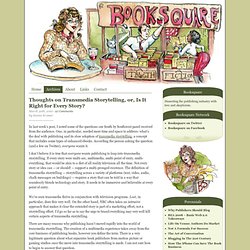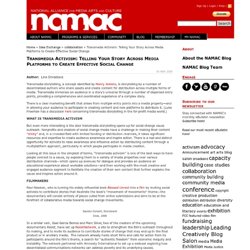

Thoughts on Transmedia Storytelling, or, Is It Right for Every Story? In last week’s post, I noted some of the questions our South by Southwest panel received from the audience.

One, in particular, needed more time and space to address: what’s the deal with publishing and its slow adoption of transmedia storytelling, a concept that includes some types of enhanced ebooks. According the person asking the question (and a few on Twitter), everyone wants it. I don’t believe it is true that everyone wants publishing to leap into transmedia storytelling. If every story were multi-arc, multimedia, multi-point of entry, multi-everything, that would be akin to a diet of all reality television all the time. Not every story or idea can — or should! There are many reasons why publishing hasn’t moved rapidly into the world of transmedia storytelling.
And for all the buzz about “enhanced ebooks”, it is early days yet. As I see it, beyond reader adoption, there are three major hurdles publishing must overcome first: rights, business model, and technology and skills. The power of transmedia storytelling. Is your favorite entertainment character on your TV as well your computer screen and your phone? If so…the fans of Transmedia storytelling wouldn’t be surprised. Transmedia storytelling, often referred to as crossmedia or multiplatform storytelling takes the elements of a character’s narrative and applies them uniquely to each medium while extending the story.
Research has shown that when consumers meet their characters in different media contexts their bonds are strengthened. It’s like bumping into your CEO at an amusement park. The context changes the relationship and strengthens it. Jeff Gomez is a producer and Hollywood creative executive who’s really dedicated himself to the Transmedia model with great success. Jeff, how does Transmedia storytelling differ from just telling a story in different mediums? Under the traditional model, when a big movie comes out, for example, we are offered the novelization, the adaptation in comics, and the videogame version for our Xboxes. La scénarisation d'expériences Transmédias.
Transmedia Activism: Telling Your Story Across Media Platforms to Create Effective Social Change. Transmedia storytelling, a concept identified by Henry Jenkins , is storytelling by a number of decentralized authors who share assets and create content for distribution across multiple forms of media.

Transmedia immerses an audience in a story’s universe through a number of dispersed entry points, providing a comprehensive and coordinated experience of a complex story. There is a clear marketing benefit that arises from multiple entry points into a media property—and in allowing your audience to participate in creating content and new platforms to distribute it. (Luke Freeman has a discussion here concerning transmedia storytelling in the for-profit media world.) But even more interesting is the door transmedia storytelling opens up for social change cause outreach.
Spooky Concert, Storyboard Slide, 2008 Organizations have also been successful in executing transmedia efforts. So how do you do it? The question of resources, specifically funding, is more difficult. Storytelling: Cross-Media, Transmedia, Immersive ... All the Same Thing? I’ve been seeing and thinking recently a lot about the terms: cross-media storytelling transmedia storytelling immersive storytelling distributed storytelling As I read about these terms, they all seem to be talking about roughly the same thing.
I figured if anyone knew about the nuances of difference among the terms, it would be Christy Dena, who has focused her doctoral studies on what she describes as “a new form of storytelling & gaming” (which, I believe, she is currently calling “cross-platform” storytelling). Indeed, she does offer an answer, and my puny list above, it turns out, is just the tip of the iceberg. Christy provides a lengthy list of terms that she states are either the equivalent or sub-sets of cross-media. I don’t want to steal her thunder by repeating the whole list — and I also tend to shun those that directly reference games because I’m just not into games — so here’s a very abbreviated version of her list (in addition to those at the top of this entry):